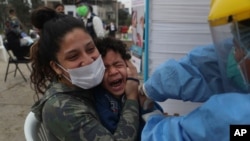ໄດ້ມີການຫລຸດລົງທີ່ໜ້າວິຕົກ ກ່ຽວກັບຈຳນວນເດັກທີ່ໄດ້ຮັບການສັກຢາປ້ອງ ກັນພະ
ຍາດຄໍຕີບ ບາດທະຍັກຫຼືເຕຕາໂນສ ແລະໄຂ້ອອກຕຸ່ມ ທີ່ອົງການສະຫະປະຊາຊາດ
ໄດ້ເຕືອນ ໃນວັນພຸດວານນີ້.
ອົງການອະນາໄມໂລກ ຫຼື WHO ແລະອົງການກອງທຶນເດັກ ສະຫະປະຊາ ຊາດ ຫຼື
UNICEF ໄດ້ຖີ້ມໂທດໃສ່ການຫລຸດ ໃນການຮັກສາສຸຂະພາບເປັນ ປະຈຳດັ່ງກ່າວ
ໃສ່ການລະບາດຂອງໄວຣັສໂຄໂຣນາ.
ຫົວໜ້າອົງການອະນາໄມໂລກ WHO ດຣ. ເທດຣອສ ອາດານອມ ເກີເບຣ-ເຢຊຸສ
ກ່າວວ່າ “ວັກຊິນເປັນເຄື່ອງມືທີ່ມີອຳນາດແຮງຢູ່ໃນປະຫວັດສາທາລະນະສຸກ ແລະ
ພວກເດັກນ້ອຍກຳລັງໄດ້ຮັບການສັກຢາເພີ້ມຂຶ້ນແບບທີ່ບໍ່ເຄີຍມີ ມາກ່ອນ. ແຕ່ວ່າ
ການແຜ່ລະບາດຂອງໂຄວິດ-19 ໄດ້ເຮັດໃຫ້ຄວາມກ້າວໜ້າ ດັ່ງກ່າວ ຕົກຢູ່ໃນສ່ຽງ.
ການຫລີກລ່ຽງຄວາມເຈັບປວດ ແລະເສຍຊີວິດທີ່ເປັນ ສາເຫດໂດຍພວກເດັກນ້ອຍ
ທີ່ບໍ່ໄດ້ຮັບການສັກຢາປ້ອງກັນເປັນປະຈຳນັ້ນອາດ ໃຫຍ່ກວ່າໂຄວິດ-19 ນັ້ນອີກ.”
ອົງການ WHO ແລະ UNICEF ກ່າວວ່າ ເຖິງແມ່ນວ່າມີວັກຊິນໄວ້ໃຫ້ພວກ ເດັກ
ນ້ອຍທີ່ຕ້ອງການນັ້ນ ພາກັນຢ້ານ ບໍ່ຢາກອອກຈາກເຮືອນ ເພາະວ່າໄວຣັສ ໂຄໂຣນາ
ຫຼືມີຄວາມລໍາບາກໃນການເດີນທາງເພາະວ່າການຈຳກັດຂອງພະຍາດ ໂຄວິດ-19.
ແຕ່ວ່າກ່ອນເກີດການແຜ່ລະບາດນັ້ນ ບັນດາອົງການໄດ້ກ່າວວ່າ ຄວາມຄືບໜ້າ ໃນ
ການສັກຢາໃຫ້ແກ່ພວກເດັກນ້ອຍໄດ້ຫລຸດລົງ. ເຂົາເຈົ້າກ່າວວ່າ ເດັກນ້ອຍ ເກືອບ
14 ລ້ານຄົນບໍ່ໄດ້ຮັບການສັກຢາຕ້ານໄຂ້ອອກຕຸ່ມ ແລະໄອຫອບໃນປີ 2019. ສ່ວນ
ໃຫຍ່ຂອງພວກເດັກນ້ອຍເຫລົ່ານີ້ຢູ່ອາຟຣິກາ. ຄວາມລໍາບາກດ້ານ ເສດຖະກິດຍັງ
ຂັດຂວງຕໍ່ພວກເດັກນ້ອຍຢູ່ໃນບຣາຊິນ ອິນເດຍ ອິນໂດເນເຊຍ ເມັກຊິໂກ ປາກິສຖານ
ແລະຟິລິບປິນຈາກການສັກຢາວັກຊິນທີີ່ມີຄວາມຈຳເປັນ.
ຫົວໜ້າບໍລິຫານອົງການ UNICEF ທ່ານນາງເຮັນຣິອັດຕາ ຟໍເຣ ກ່າວວ່າ “ໂຄວິດ-19
ກ່ອນໜ້ານັ້ນ ໄດ້ເຮັດໃຫ້ເປັນການສັກຢາວັກຊີນ ຊຶ່ງກ່ອນໜ້າ ນັ້ນ ມີຂຶ້ນຢ່າງເປັນປົກ
ກະຕິ ກາຍເປັນບັນຫາທ້າທາຍ. ພວກເຮົາຕ້ອງໄດ້ປ້ອງ ກັນບໍ່ໃຫ້ມີການຊຸດໂຊມໄປ
ກວ່ານີ້ ໃນການສັກຢາວັກຊິນ ແລະເລັ່ງລັດການ ເລີ້ມໂຄງການສັກຢາ ກ່ອນການຂົ່ມ
ຂູ່ຕໍ່ຊີວິດຕໍ່ພວກເດັກນ້ອຍຈາກພະຍາດ ອື່ນໆ. ພວກເຮົາບໍ່ສາມາດແລກປ່ຽນວິກິດ
ການນຶ່ງຂອງສຸຂະພາບໄປໃສ່ອັນ ອື່ນ.”
There has been an alarming decline in the number of children getting vaccinated for such preventable diseases as diphtheria, tetanus and measles, the United Nations warned Wednesday.
The U.N.’s World Health Organization and UNICEF blame the decline on the disruption of routine health care caused by the coronavirus pandemic.
“Vaccines are one of the most powerful tools in the history of public health, and more children are now being immunized than ever before,” WHO chief Dr. Tedros Adhanom Ghebreyesus said. “But the pandemic has put those gains at risk. The avoidable suffering and death caused by children missing out on routine immunizations could be far greater than COVID-19 itself.”
The WHO and UNICEF said that even when vaccines are available, many children who need them are afraid to leave their homes because of the coronavirus or the difficulties of traveling because of COVID-19 restrictions.
But even before the pandemic hit, the agencies said, progress in vaccinating children was slipping. They said nearly 14 million children did not get shots against measles and pertussis in 2019. Most of these children live in Africa. Economic hardships also prevented children in Brazil, India, Indonesia, Mexico, Pakistan and the Philippines from getting necessary vaccines.
“COVID-19 has made previously routine vaccination a daunting challenge,” UNICEF Executive Director Henrietta Fore said. “We must prevent a further deterioration in vaccine coverage and urgently resume vaccination programs before children’s lives are threatened by other diseases. We cannot trade one health crisis for another.”





